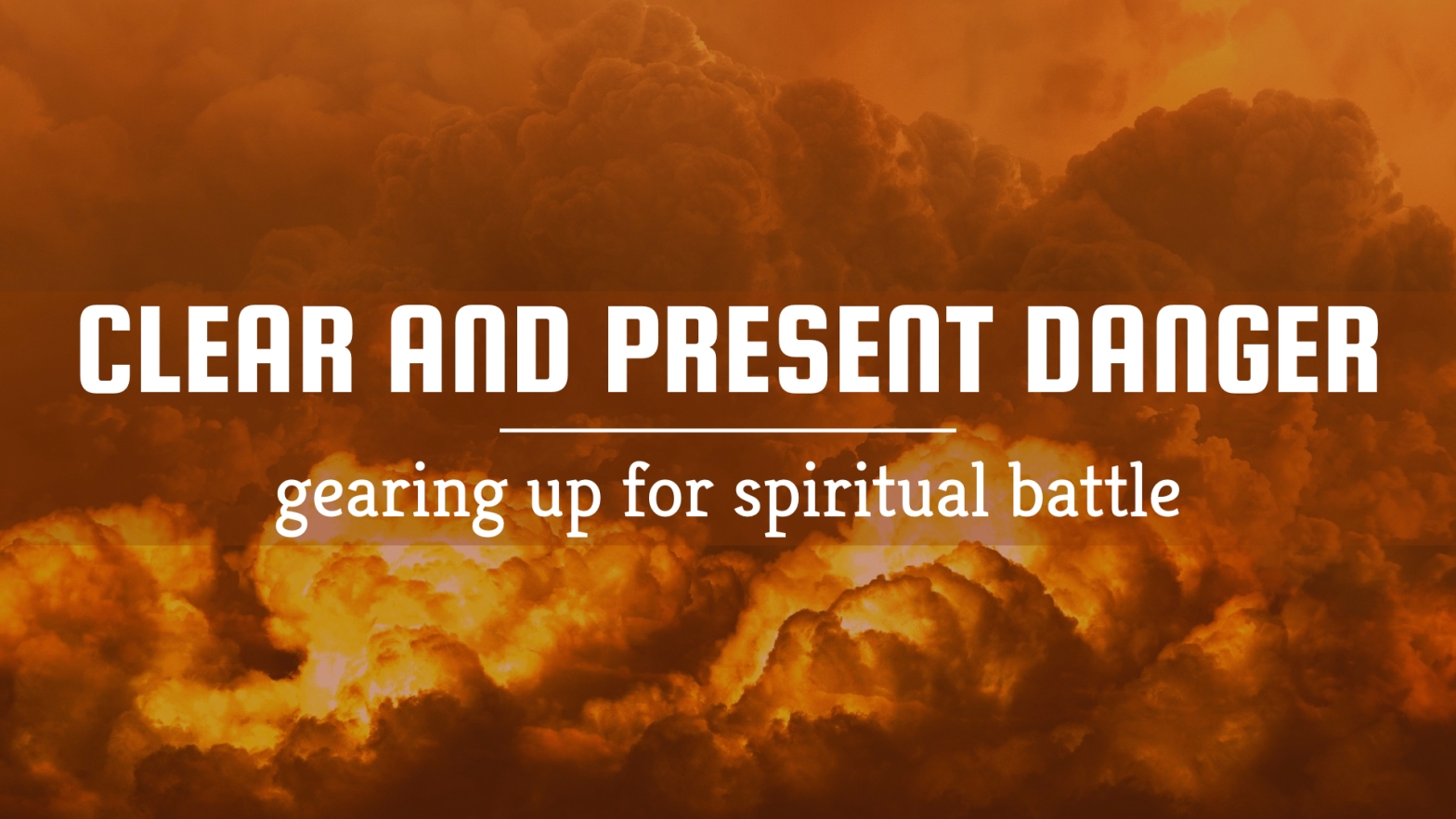Live audio and manuscript of my message at Central Church of Christ, Stockton, CA, for July 14th, 2019. From our ongoing series, Clear and present danger: gearing up for spiritual battle.
The texts we heard in worship were Exodus 15.1-3, 21b; Psalm 76.4-12; and Judges 6.11-24.
If you’d like to listen to the message, please click the link below.
In spiritual war, Christ is always the hero
Today we’re continuing our ongoing series, Clear and Present Danger, on the topic of spiritual warfare. That was this year’s camp theme. Today we’ll be in Judges 6, looking at the story of Gideon. Of course, if you were at camp you might remember this story, and you’ll definitely be familiar with the topic.
God chose Gideon to lead his people Israel in battle against the Midianites, who were oppressing them.
You know, one mistake we often make when we go to these Old Testament stories is that make people like Gideon the hero. We say, Oh, look what they did! What’s your excuse?
But if you really pay attention to Gideon’s story, I can’t imagine a less heroic hero. He wasn’t brave. He wasn’t powerful. I’m not sure if he even had faith the size of a mustard seed.
And that’s exactly the point. Gideon’s not the hero. God is. Gideon was only a mighty warrior because Christ was with him.
And it’s the same for us, we are not the heroes of our story. God is. We struggle. We get hurt. We get overwhelmed.
Sometimes you find yourself in spiritual circumstances—and hint, all of life has a spiritual dimension—that are just beating the brakes right off of you. You can’t save yourself. Like Gideon, you will only find victory in Christ and through Christ.
Now, I bet I know what some of you are thinking. You know the Gideon story. Or you heard it this morning. Or you have your Bible opened to Judges 6 right now. And you’re thinking, Wait, you’re saying Christ was with Gideon. But this story doesn’t say anything about Jesus! It’s the Old Testament, silly. Jesus wasn’t even born yet.
Oh, Christ is absolutely in Gideon’s story. So if I’ve piqued your interest, just keep listening. He’s in there. Actually, Christ is on every page of the Bible, if you know how to look for him.
And maybe as you learn to see Christ more clearly in every story scripture tells, you’ll also learn to see him more clearly in your own story. How he’s been fighting for you all along.
Christ is the meaning, the hope, and the fulfillment of all those old stories. And he can make sense of your story too.
So let’s see how Christ made Gideon mighty for battle. Because we’ll learn a few things about how Christ makes us fit for victory, too.
Threshing wheat in a winepress: an odd detail that reveals so much
In Judges 6.11, we find Gideon where God found him. And it was a pretty strange place for him to be. It says Gideon was threshing wheat in a winepress.
Okay, stop right there. I don’t know a whole lot about threshing wheat or pressing wine. But I do know a wine press is a weird place to be threshing wheat.
Okay, let me help you picture this.
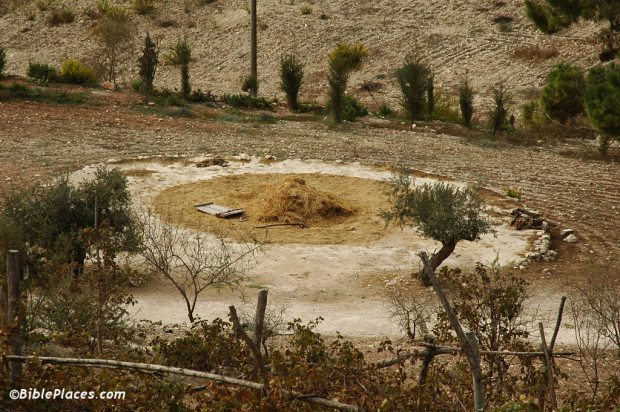
This is a threshing floor. It’s where you remove the chaff from your wheat. Here’s how it works. You toss the grain into the air, and you let the wind carry the chaff away. You need a wide open space with access to … you know … wind for this to work well.
But Gideon was threshing his wheat in a winepress. Okay, this is an ancient winepress.
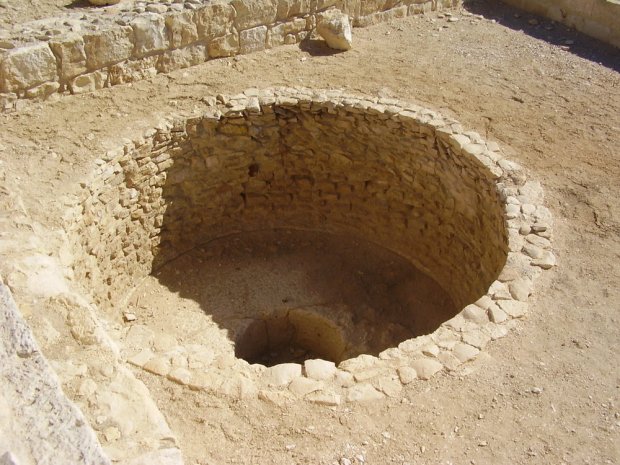
Do you notice where this winepress is? That’s right—it’s underground! So Gideon is down in a hole in the ground, trying to thresh wheat.
So you usually thresh wheat in a wide-open space, but Gideon was underground. It probably made it really hard to do his work, don’t you think?
Why would he be trying to thresh wheat in a place where you’re supposed to crush grapes?
Well, the Bible tells us. He was threshing his wheat in a winepress to hide it from the Midianites.
Gideon was hiding what he was doing, because he was afraid.
The beginning of Judges 6 gives us some background on why Gideon was hiding from the Midianites. Basically, Midianite invaders would ride into Israel every year on camelback, thump on the Israelites, and steal all their crops.
And here’s the amazing thing: Judges 6.1 tells us it was God who sent the Midianites to oppose his people Israel. Because they weren’t being faithful to the Lord. They were out worshiping the gods of the other nations.
This is an aspect of spiritual warfare we don’t talk about much. Over and over again scripture shows us God as a warrior fighting for his people. But when we’re unfaithful to God, he will also fight against his people.
There’s a sad pattern to the book of Judges. Israel forgets the Lord and does evil. So God allows an enemy nation to oppress them. So they cry out to the Lord for rescue. Then God raises up a Judge to save them. And the land has peace for a generation or so.
Wash. Rinse. Repeat.
And so that’s what’s going on when we meet Gideon. He’s just a pathetic little man, hiding out from his enemies. Keep reading Judges 6, and you find out he was as sinful as everyone else. He was also worshiping idols.
And Gideon was afraid. And fear makes us do things that don’t make any sense. Like threshing grain in a winepress.
Deep down, you know Gideon knew how messed up this all was. He never meant to end up hiding out in a winepress. And deep down, I’m sure he knew that God didn’t want it to be this way, either. The Lord didn’t rescue the Israelites from slavery in Egypt, only for them to end up hiding from their enemies in mountains and caves and winepresses.
Sin drove Gideon into the winepress. But fear held him hostage there. He was stuck doing things that made no sense in a place he was never supposed to be.
But it’s right there in his lowest, darkest moment, when sin and shame and fear had overwhelmed him, that God’s light tore through his darkness, and God spoke the words that would raise Gideon up out of the winepress.
Because that’s when the angel of the Lord appeared to Gideon, and he said, “The Lord is with you, mighty warrior.”
You know, if Gideon never expected to find himself threshing wheat in a winepress, he certainly never expected to hear God call him a mighty warrior.
After all, he was just a scared, pathetic, sinful man. Hiding out in a hole in the ground.
Remember how I said Christ was in this story? Hold a spot open for this mysterious person, the angel of the Lord, who showed up out of nowhere to rescue Gideon from the winepress. We’ll come back to him.
For now, let’s get personal for a minute.
When you’re stuck in a winepress
I think all of us can relate to Gideon’s story. I believe we all have things that take hold in our lives that God never intended for us.
Maybe it’s a sin you struggle with. Or maybe something has happened to you that’s just broken you, shattered you, made you feel so small and helpless.
I think we all end up like Gideon in his winepress. At some point in everyone’s life, you find yourself in a place you never meant to be, doing things that don’t make any sense.
And by the time you realize how bad it is, and how much trouble you’re in, you’re stuck.
Your shame and your fear are so heavy, so oppressive, that they keep you trapped in this place you never meant to be, doing crazy things that don’t make sense.
Or maybe you just feel so broken, so worthless, so beat down, so insignificant that you just decide it’s best to just keep your head down. It’s safe down there in the winepress. They can’t hurt you there.
Maybe you’ve had your own experience of threshing wheat in a winepress. Maybe spiritually, emotionally that’s where you are now.
If so, how would it make you feel if Christ showed up at your winepress and said: The Lord is with you, mighty warrior?
How would that make you feel? What would you think? What would you say to him?
We’re going to find out how Gideon felt, and what he said.
Christ came to rescue Gideon from the winepress
But before we go there—I promised you I’d show you where to find Christ in this story. And I hinted that he’s connected to this mysterious Angel of the Lord who comes to Gideon.
So just for a couple of minutes, let’s put on our Bible nerd glasses and pocket protectors so we can see Christ in the story.
Here’s the short answer: The Angel of the LORD in this story tweren’t no ordinary angel.
The Angel of the Lord—notice it says the angel, not an angel—is this mysterious figure who shows up several times in the Old Testament.
Now, an angel is a divine messenger sent from God, who takes on a human form. That’s why in a lot of Old Testament stories they’re mistaken for regular men. Incidentally, the Bible never says angels have wings. Other heavenly creatures, like cherubim and seraphim, have wings. Not angels.
Okay, but this Angel of the Lord is special. One of the places we see him is in Exodus 3, when God first appears to Moses. Remember, Moses was tending his father-in-law’s sheep when he saw this bush that was on fire, but not consumed.
And it says, the angel of the LORD appeared to him in flames of fire from within a bush. So you’re not only supposed to imagine that this bush is on fire but never burned up. You’re also supposed to see this human figure standing in the flames.
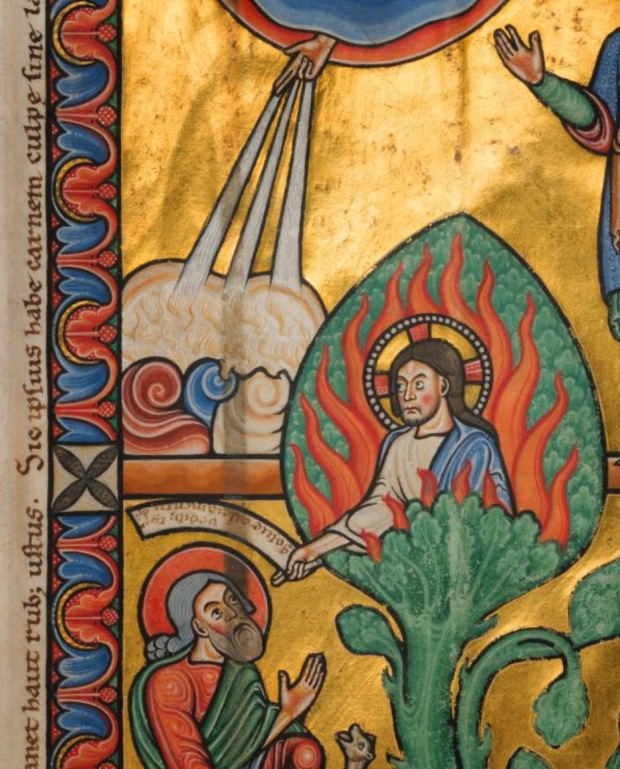
And then it says: When the LORD saw that he had gone over to look, God called to him from within the bush, “Moses! Moses!”
So in your Bibles, when you see the Lord in all caps, that’s God’s special, holy, covenant name—YHWH. So here’s where things get really interesting. Notice that this dude in the bush is first called the Angel of the LORD. Then he’s simply called the LORD, or YHWH. And finally he’s simply called, God. But it’s all the same Person!
So this Angel of the Lord is a human figure who is both distinct from God, but also is God. Do you see where this is going?
This Angel of the Lord pops up all over the Old Testament. And he does things regular angels don’t do. He accepts worship, like in today’s story, where he receives a sacrifice from Gideon. And when people see him, they say they’ve seen God.
I could say a lot more about this. But here’s the short version. When the first Christians saw these stories in the Old Testament about a divine-human figure who was essentially the face of God, they said: Oh, that was Jesus before he was Jesus!
In other words, these were Old Testament appearances of Christ. The Angel of the Lord was the eternal Son of God in human form.
Here’s one way I’ve heard it put: Christ enjoyed trying on the clothes of His incarnation. [1] But these appearances also helped prepare God’s people for the time when Christ would come in the flesh.
So it was Christ who appeared to Gideon, quietly threshing his grain in a winepress. And it was Christ who told him: The Lord is with you, mighty warrior.
Nobody would have looked at Gideon and seen a mighty warrior chosen by God. All they would have seen was a scared, sinful, shaky little man. Keeping a low profile. Hiding, ducked down in a winepress.
That’s all Gideon could see when he looked at himself, too. But Christ saw something very different when he looked at Gideon. He saw a mighty warrior, chosen by God to rescue his people from the Midianites.
But Gideon still couldn’t see what Christ saw. He shot back: if the Lord is with us, why has all this happened to us? Why is our land overrun with Midianites, if God is with us? Why am I down here hiding my wheat in a winepress? Gideon says, No. God is not with us. The Lord has abandoned us.
I love how Christ doesn’t fuss at Gideon. He doesn’t take this opportunity to remind him that God hadn’t abandoned Israel, they had abandoned God. He doesn’t quote the Bible at him, or club him over the head with all his sins and failures.
The Bible tells us that Christ is Immanuel, or God-with-us. Christ’s mere presence with Gideon said: No, the Lord has not abandoned you. I’m here with you now.
Undeterred by Gideon’s disbelief, Christ tells him: Go in the strength you have and save Israel out of Midian’s hand.
But Gideon still didn’t understand, and he still didn’t believe. How can I save Israel? My clan is the weakest in Manasseh—one of the tiniest of Israel’s tribes—and I am the least in my family.
When Gideon saw himself, all he could see was a weak and frightened man, from a pathetic little tribe in a God-forsaken corner of the world.
He couldn’t see past his weakness to Christ’s transforming power. He didn’t understand that one of God’s greatest joys is pulling Gideons up out of their winepresses, and pulling off impossible victories with them, against impossible odds.
Now patiently and tenderly—but firmly—Christ assures Gideon: I will be with you, and you will strike down all the Midianites.
Gideon still wasn’t convinced. He needed to be absolutely certain that God was really with him before he climbed out of his winepress, to go in the strength of Christ and destroy the oppressors.
Se he devised a test—one of several hoops he made God jump through before he would trust him. You know what’s amazing? God jumped through every hoop Gideon put down. If that isn’t steadfast love, I don’t know what is.
Basically, Gideon said: God, if this really is you, then you’ll accept my sacrifice.
So Gideon prepared meat and bread as an offering. He laid it out on a rock, a makeshift altar, before Christ. Then Christ reached out his staff and touched the sacrifice with it. And Gideon’s offering was consumed in a flash of fire.
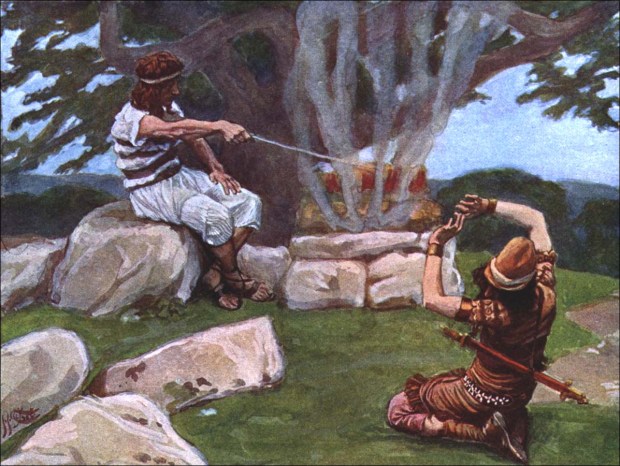
Well, Gideon did become a mighty warrior after all. In the next chapter of Judges, he led an army of 300 Israelites who cast off their Midianite oppressors. Even though they were outnumbered nearly 500-to-1, and armed with trumpets and torches.
Excuse me: They were armed with trumpets and torches and the glorious, world-changing, oppression-destroying power of Christ.
But as spectacular as that battle must have been, I kind of think the most intense battle was fought and won in Gideon’s heart. It was his struggle to believe that he was who Christ told him he was—a mighty warrior.
It was the battle Christ won to rescue Gideon from the shame and fear that had taken hold of his life, and kept him stuck threshing wheat in a winepress.
And that battle meant so much to Gideon that Judges 6 tells us he eventually went back to where that winepress had been, and built a real altar there. And he named his altar, The Lord Is Peace.
Christ rescues us from the winepress
So, let’s make this personal again. I really do believe that all of us end up like Gideon sometimes, threshing our wheat in a winepress.
Gideon was hiding from roving bands of Midianite invaders. They had taken hold of the land, so fear had taken hold of Gideon’s life.
What about you? What’s the oppressive power in your life? What is it that’s left you stranded in a place you never meant to be, doing things that don’t make any sense?
I don’t know what that thing is. Maybe only you and God know.
But I do know that God doesn’t want you to stay hunkered down in your winepress, keeping your head down, with only your fear and brokenness to keep you company.
I do know that God the Father sent his Son Jesus Christ to pull you out of that winepress.
And I also know—from experience—how natural it feels to argue with Jesus when he comes to rescue you from that hole you’re stuck in. Oh, I’m sure God’s given up on me. I’m a nobody, a nothing. I deserve to be stuck in this winepress forever.
But I also happen to know that Christ has already won a sweeping victory over whatever it is that fills you with shame or fear. Because Christ already placed it on himself, and he took it to the cross with him. And God’s righteous anger against everything evil and oppressive that he never intended for us was poured out at the cross.
God already went to war against all of it. It died with Christ, and he took it to the grave with him. And when he rose from the dead, he left it all there. Buried.
So I don’t know what you see when you look at yourself. But I do know that, just like Gideon, Christ doesn’t you the way you see yourself. Christ sees who you can be. He sees God’s loving intentions for you. Christ sees who God is making you in him, by the power of the Holy Spirit.
So when Christ calls you a mighty warrior; a relentlessly-loved daughter or son of God; or a living stone to help build a temple to his glory: believe him. Trust him. You are exactly who he tells you you are.
You can trust him because he died and rose again to set you free from your winepress. An altar not made with human hands bears witness to Christ’s victory. That altar is his cross and his empty tomb. Sin and shame and fear and death—everything that has taken hold of our lives to oppress us—have all been consumed on that altar.
And just like Gideon’s altar, the cross of Christ and his empty tomb proclaim that the Lord is Peace.
